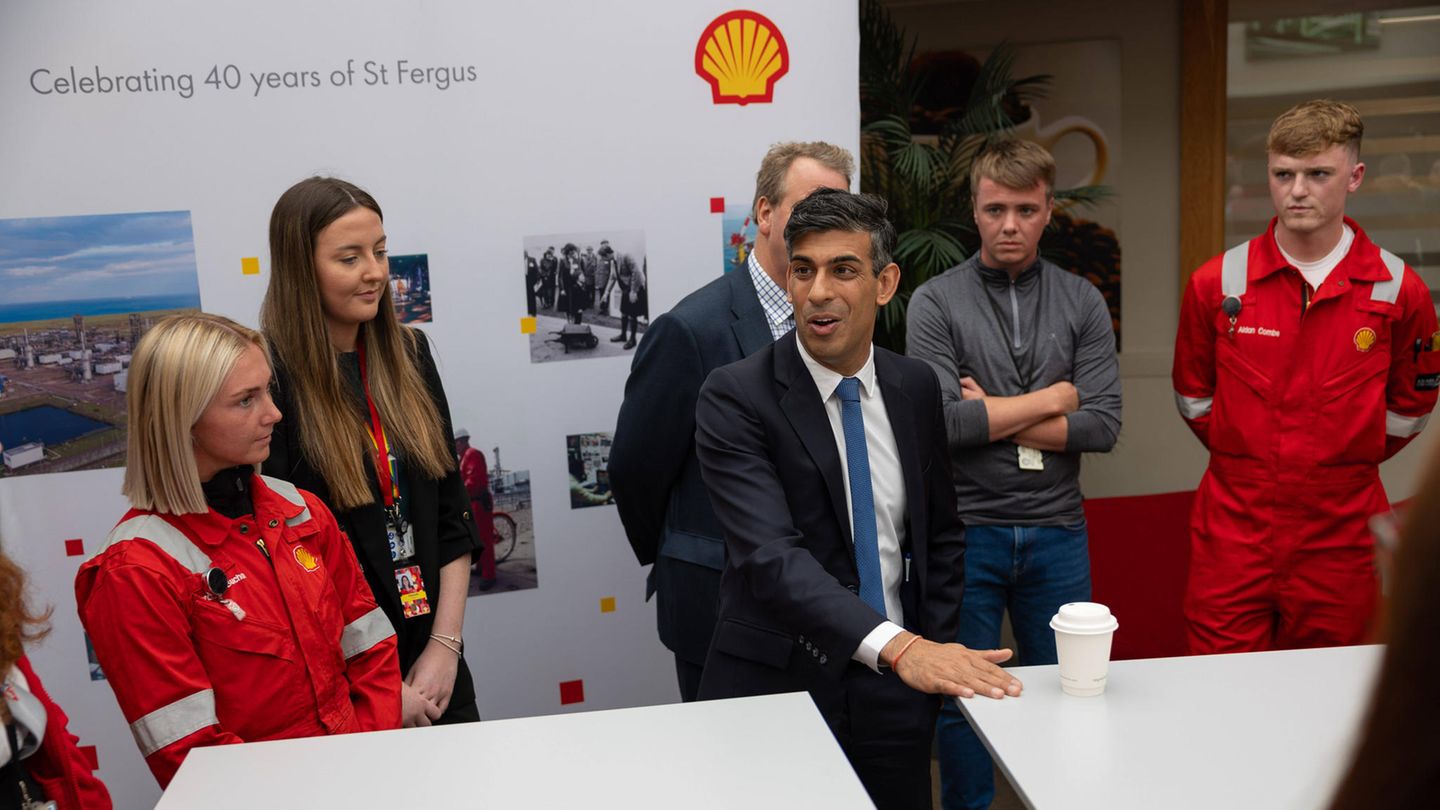New mining licenses More British oil, cheap energy for Europe?
Prime Minister Sunak, who is here visiting a gas power station in Aberdeen, wants to increase British oil production in the North Sea again
© Simon Walker / Avalon / Imago
To the chagrin of environmentalists, Great Britain wants to produce more North Sea oil again. What does this mean for consumers? Can German homeowners hope for lower energy prices?
The British North Sea is divided as an allotment colony. But on 258 lots, the tenants don’t grow sea cucumbers or let their souls dangle in the seawater. They produce oil and gas. The first oil field was discovered in 1970, and production began five years later. Today, four of these sectors are being developed, with a combined daily capacity of 1.4 million barrels. At the peak of British oil production, North Sea oil contributed seven percent of the total GDP.
But that is long gone. By 2050, the UK wants to be “net zero”, i.e. climate neutral. Combustion vehicles will not be allowed from 2030. More recently, the left-wing opposition Labor Party has called for new licenses for oil and gas production in the North Sea to be banned. Prime Minister Rishi Sunak has now stifled these voices. On Monday it was announced that the Tory government planned to issue more than 100 new extraction licences. A shift in climate policy.
Maximum exit policy and carbon sequestration
Rishi Sunak hopes to extract as much oil and gas from the North Sea as possible. He is pursuing a “capital policy” which environmental campaigners believe will review the UK’s climate protection commitments. On the other hand, Sunak says that domestic supply is much more efficient than importing oil and gas from other countries, and that the move is “completely in line with our plan to go to net zero”.
Great Britain wants to achieve the goal of reducing greenhouse gas emissions to zero through “carbon capture”. “capture” carbon dioxide emissions from industrial processes. This carbon is then transported from its source by ship or pipeline and stored deep underground in geological formations.
Are European energy prices falling?
Will the UK energy rebalancing affect European energy prices? “As long as the British are still in the EU, they have played a leading role in climate protection,” says Franziska Holz, who researches energy, transport and the environment at the German Institute for Economic Research (DIW). This included using less oil, but also producing less oil. “Rishi Sunak is now wondering about it.”
Thus, the issuance of new production licenses has a positive effect. “I don’t think the newly developed volumes will have an impact on the outlook for lower oil prices.” Instead, Sunak wants to use them to replace deposits that were mined last year. It probably won’t increase production. There is also no spare capacity that can be exported. “But there’s no turning back, which is really what we’re aiming for.”
Offshore wind farms have been abolished, and carbon capture is rampant
At the same time, more and more offshore wind farm projects are being cancelled, especially in Great Britain. The expert said that this is very worrying. Does Carbon Capture Work as a New Cycle Correction? “I take a very critical view of that. We’ve been talking about carbon capture since the early 2000s. So for over 20 years. But we don’t have a facility anywhere.” This strategy is typical of fossil fuel countries. The fact that Sunak Carbon Capture – or CCS for short – currently being deployed in this way is a sign of a move away from renewable energies.
The bidding process for the new licenses is scheduled to begin next fall. The permitting process, which is overseen by the North Sea Transitional Authority, includes an assessment of climate impact but provides more flexibility than previously to prospecting for reserves near areas currently permitted.

“Alcohol buff. Troublemaker. Introvert. Student. Social media lover. Web ninja. Bacon fan. Reader.”







More Stories
What are the opportunities available to the company?
Dirty Deals – Refugee deal between Great Britain and Rwanda
YouTube significantly increases advertising revenues – Quotenmeter.de